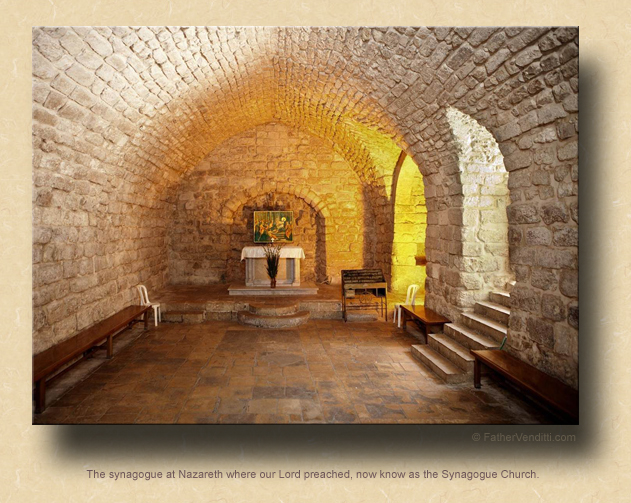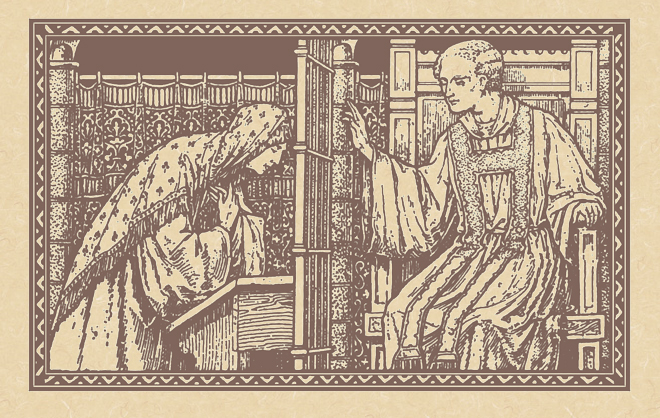Not Will-Power, but Surrender.
The Third Monday of Lent.
Lessons from the feria, according to the ordinary form of the Roman Rite:
• II Kings 5: 1-15.
• Psalm 42: 2-3; 43: 3-4.
• Luke 4: 24-30.
Lessons from the feria, according to the extraordinary form of the Roman Rite:
• IV Kings 5: 1-15.
• [Gradual] Psalm 55: 9 , 2.
• [Tract] Psalm 102: 10.
• Luke 4: 23-30.
FatherVenditti.com
|
9:34 AM 3/5/2018 — “My soul is longing and yearning for the courts of the Lord. My heart and my flesh cry out to the living God.”

That’s the Entrance Antiphon or Introit to today’s Mass, and some of you have already begun to notice that, when there is no organist or hymn, I always begin this Mass by reading that antiphon, and some have taken to reciting it with me, which I would encourage you to do. Today’s Introit is the perfect Lenten meditation: to enter the dwelling of the Lord a soul has to be clean and humble. For us to be able to see Jesus, good dispositions are needed. Once again, this is what the Gospel lesson today shows us.
Having spent some time preaching in the towns and cities of Galilee, our Lord returns to his home-town of Nazareth. He’s already known as a gifted preacher by this time, so whenever He goes home He’s invited to preach in His home-town synagogue—kind of like me who’s been invited to come home to my home town parish after so many years away. That’s where the comparison ends, by the way.
The synagogue was a relatively recent phenomenon at the time of our Lord. There’s no such thing through most of the Old Testament; it first appears as an innovation invented by a new and radical class of rabbis called the Pharisees, who don’t appear until the two books of Maccabees, just sixty years or so before the birth of our Lord. As you read your Bible you’ll notice two different groups of rabbis mentioned: the Pharisees and the Sadducees; the Sadducees being the older and more traditional class of rabbis, who rejected the reforms of the Pharisees. One of the reasons the Gospel shows our Lord sparring so frequently with the Pharisees is because our Lord was very devoted to the synagogue and the Pharisaical tradition, so the Pharisees know that He’s basically on their side, even though He does things they find confusing. The Sadducees only confront our Lord a couple of times, probably because they know that He’s a synagogue-goer, and therefore regard Him as a lost cause.
It’s important to understand why our Lord, who is not a professional rabbi, is preaching in the synagogue: the president of the synagogue was free to invite anyone he wanted to preach; and, since our Lord was already known as a gifted preacher, whenever He was home, He was invited to preach.
Unfortunately, today’s homily at the synagogue was not well received. Our Blessed Lord chooses, on this occasion, to scold the home-folks for their bigotry, pointing out that the grace of God is not dispensed according to bloodline or nationality, both of which were—and are—very important to the Jewish people. He pulls from the Old Testament two examples: the salvation of the widow of Zarephath by the Prophet Elijah, and the cure of Naaman the Syrian by the Prophet Elisha, which we heard in our first lesson from the Second Book of Kings. Both events are part of Holy Scripture, so there’s no way our Lord’s congregation can reject them; nevertheless, they represent inconvenient truths.
I think the take-way for us today is relatively simple: we spend so much energy rationalizing our spiritual and moral failures. We so easily forget that progress in the interior life is not so much a matter of will-power as it is a matter of surrendering to an openness to God’s grace. Take the example of Naaman the Syrian: on the word of the Prophet Elisha he bathed seven times in the Jordan, and his leprosy was cured immediately. He was humble and docile enough to take advice which, humanly speaking, seemed useless. May we all follow his example, confessing our sins honestly, always confident in our Blessed Lord’s mercy and grace to help us begin anew. There is no sin our Lord cannot forgive—unless, of course, we refuse to confess them.

|

